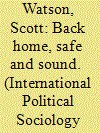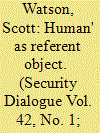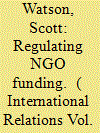| Srl | Item |
| 1 |
ID:
106195


|
|
|
|
|
| Publication |
2011.
|
| Summary/Abstract |
Challenging the representations of the securitization of migration and disease as a productive broadening of security studies or as a troubling shift associated with recent developments in international politics, this article explores how the regulation of human movement and contagious disease functions to reproduce the international/domestic foundation of the nation-state system and to support the moral basis of exclusion from individual states. Drawing on the practices of border and health regulation in Canada, and specifically through the technology of insurance, the article explores how health and immigration bureaucracies and private insurance corporations reproduce the international realm as anarchic, disordered, and dangerous through the representation of certain regions and peoples as unhealthy, irrational, and dangerous.
|
|
|
|
|
|
|
|
|
|
|
|
|
|
|
|
| 2 |
ID:
104022


|
|
|
|
|
| Publication |
2011.
|
| Summary/Abstract |
Humanitarianism rivals security in its ability to legitimize emergency measures, and has also proven to be as ambiguous and open to abuse. In this article, humanitarianism is reconceptualized as a sector of securitization, like state and societal securitization, meaning that it is a structured field of practice that draws on existing discourses and institutions to enable the implementation of emergency measures. This reconceptualization contributes to the theory of securitization by expanding its applicability beyond states and societies to humans as referent objects, but also by challenging the Copenhagen School's conceptualization of normality/exceptionality at the domestic and international levels. Drawing on the humanitarian securitization of the 2004 Indian Ocean tsunami, the article demonstrates how the structured security field of humanitarianism privileges particular actors in speaking to human insecurity, and how the humanitarian discourse reifies and reinforces a monolithic form of human identity. The article draws attention to the process of representing developments as humanitarian emergencies and uses the framework of securitization to critically examine the discourses, practices and agents of humanitarianism.
|
|
|
|
|
|
|
|
|
|
|
|
|
|
|
|
| 3 |
ID:
163099


|
|
|
|
|
| Summary/Abstract |
Securitization theory (ST) has succeeded in putting the relation between politics and security at the forefront of research in security studies. Despite this success, little attention has been given to the way states themselves produce the boundaries of legitimate political activity, particularly in relation to the boundaries between civil society and the state and between the foreign and domestic. This article is concerned with how states see the boundary between the political and the non-political as a matter of security. It investigates this question by examining the international and national efforts to restrict the financing of non-governmental organizations (NGOs) and civil society actors. It demonstrates that these entities are deemed threatening to the established boundaries of legitimate political activity and thus subject to harassment, increased regulation, and eradication. This is done by the depiction of their activities as political, rather than humanitarian/cultural/social, demonstrating that the concepts of politics operative in the ST literature are already delimited through processes of securitization and depoliticization. Continued research into the relation between politics and security must therefore consider the ways that the political itself is securitized.
|
|
|
|
|
|
|
|
|
|
|
|
|
|
|
|